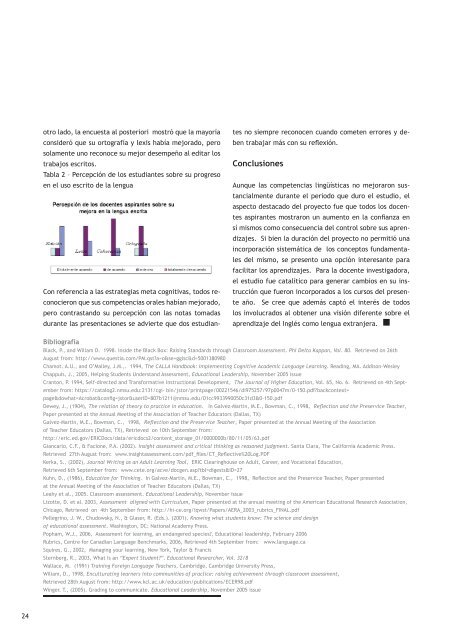Revista desde el Sur
1ra edición de la Revista desde el Sur del Centro Regional de Profesores del Sur
1ra edición de la Revista desde el Sur del Centro Regional de Profesores del Sur
Create successful ePaper yourself
Turn your PDF publications into a flip-book with our unique Google optimized e-Paper software.
otro lado, la encuesta al posteriori mostró que la mayoría<br />
consideró que su ortografía y lexis había mejorado, pero<br />
solamente uno reconoce su mejor desempeño al editar los<br />
trabajos escritos.<br />
Tabla 2 – Percepción de los estudiantes sobre su progreso<br />
en <strong>el</strong> uso escrito de la lengua<br />
Con referencia a las estrategias meta cognitivas, todos reconocieron<br />
que sus competencias orales habían mejorado,<br />
pero contrastando su percepción con las notas tomadas<br />
durante las presentaciones se advierte que dos estudiantes<br />
no siempre reconocen cuando cometen errores y deben<br />
trabajar más con su reflexión.<br />
Conclusiones<br />
Aunque las competencias lingüísticas no mejoraron sustancialmente<br />
durante <strong>el</strong> periodo que duro <strong>el</strong> estudio, <strong>el</strong><br />
aspecto destacado d<strong>el</strong> proyecto fue que todos los docentes<br />
aspirantes mostraron un aumento en la confianza en<br />
sí mismos como consecuencia d<strong>el</strong> control sobre sus aprendizajes.<br />
Si bien la duración d<strong>el</strong> proyecto no permitió una<br />
incorporación sistemática de los conceptos fundamentales<br />
d<strong>el</strong> mismo, se presento una opción interesante para<br />
facilitar los aprendizajes. Para la docente investigadora,<br />
<strong>el</strong> estudio fue catalítico para generar cambios en su instrucción<br />
que fueron incorporados a los cursos d<strong>el</strong> presente<br />
año. Se cree que además captó <strong>el</strong> interés de todos<br />
los involucrados al obtener una visión diferente sobre <strong>el</strong><br />
aprendizaje d<strong>el</strong> Inglés como lengua extranjera.<br />
Bibliografía<br />
Black, P., and Wiliam D. 1998. Inside the Black Box: Raising Standards through Classroom Assessment. Phi D<strong>el</strong>ta Kappan, Vol. 80. Retrieved on 26th<br />
August from: http://www.questia.com/PM.qst?a=o&se=gglsc&d=5001380980<br />
Chamot. A.U., and O’Malley, J.M.,. 1994, The CALLA Handbook: Implementing Cognitive Academic Language Learning. Reading, MA. Addison-Wesley<br />
Chappuis, J., 2005, H<strong>el</strong>ping Students Understand Assessment, Educational Leadership, November 2005 issue<br />
Cranton, P. 1994, S<strong>el</strong>f-directed and Transformative Instructional Dev<strong>el</strong>opment, The Journal of Higher Education, Vol. 65, No. 6. Retrieved on 4th September<br />
from: https://catalog2.nmsu.edu:2131/cgi- bin/jstor/printpage/00221546/di975257/97p0047m/0-150.pdf?backcontext=<br />
page&dowhat=Acrobat&config=jstor&userID=807b1211@nmsu.edu/01cc9933990050c31d3&0-150.pdf<br />
Dewey, J., (1904), The r<strong>el</strong>ation of theory to practice in education. In Galvez-Martin, M.E., Bowman, C., 1998, Reflection and the Preservice Teacher,<br />
Paper presented at the Annual Meeting of the Association of Teacher Educators (Dallas, TX)<br />
Galvez-Martin, M.E., Bowman, C., 1998, Reflection and the Preservice Teacher, Paper presented at the Annual Meeting of the Association<br />
of Teacher Educators (Dallas, TX), Retrieved on 10th September from:<br />
http://eric.ed.gov/ERICDocs/data/ericdocs2/content_storage_01/0000000b/80/11/05/63.pdf<br />
Giancarlo, C.F., & Facione, P.A. (2002). Insight assessment and critical thinking as reasoned judgment. Santa Clara, The California Academic Press.<br />
Retrieved 27th August from: www.insightassessment.com/pdf_files/CT_Reflective%20Log.PDF<br />
Kerka, S., (2002), Journal Writing as an Adult Learning Tool, ERIC Clearinghouse on Adult, Career, and Vocational Education,<br />
Retrieved 6th September from: www.cete.org/acve/docgen.asp?tbl=digests&ID=27<br />
Kuhn, D., (1986), Education for Thinking. In Galvez-Martin, M.E., Bowman, C., 1998, Reflection and the Preservice Teacher, Paper presented<br />
at the Annual Meeting of the Association of Teacher Educators (Dallas, TX)<br />
Leahy et al., 2005. Classroom assessment. Educational Leadership, November issue<br />
Lizotte, D. et al. 2003, Assessment aligned with Curriculum, Paper presented at the annual meeting of the American Educational Research Association,<br />
Chicago, Retrieved on 4th September from: http://hi-ce.org/iqwst/Papers/AERA_2003_rubrics_FINAL.pdf<br />
P<strong>el</strong>legrino, J. W., Chudowsky, N., & Glaser, R. (Eds.). (2001). Knowing what students know: The science and design<br />
of educational assessment. Washington, DC: National Academy Press.<br />
Popham, W.J., 2006, Assessment for learning, an endangered species?, Educational leadership, February 2006<br />
Rubrics, Centre for Canadian Language Benchmarks, 2006, Retrieved 4th September from: www.language.ca<br />
Squires, G., 2002, Managing your learning, New York, Taylor & Francis<br />
Sternberg, R., 2003, What Is an “Expert Student?”. Educational Researcher, Vol. 32/8<br />
Wallace, M. (1991) Training Foreign Language Teachers, Cambridge, Cambridge University Press,<br />
Wiliam, D., 1998, Enculturating learners into communities of practice: raising achievement through classroom assessment,<br />
Retrieved 28th August from: http://www.kcl.ac.uk/education/publications/ECER98.pdf<br />
Winger. T., (2005). Grading to communicate. Educational Leadership, November 2005 issue<br />
24



